How a terrorist group set off a famine, affecting thousands of families
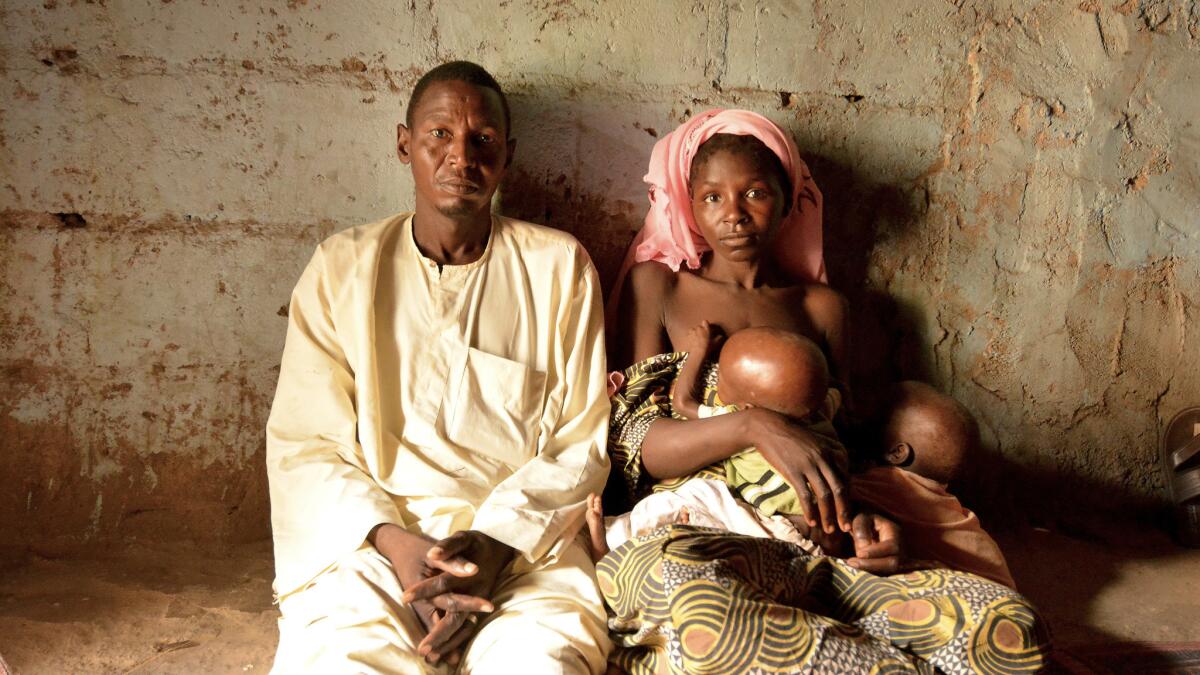
- Share via
Reporting from Maiduguri, Nigeria — The boy’s frail cry pierced his father’s heart.
Saleh Umar feared his youngest son, Hassan, would die. The 1-year-old’s ribs protruded sharply, his shrunken arms were like twigs, his eyes dark hollows.
Since being driven from their village by the Nigerian extremist group and Islamic State affiliate Boko Haram, Umar and his family have often gone hungry. The six of them made their way to the dusty, sprawling city of Maiduguri, and Umar’s wife wandered the city for days in vain seeking help for Hassan.
Umar then made a desperate decision. On Oct. 6 he took the meager food the family had scraped together, a small bag of sorghum, and walked nine miles to his village to plant the seeds — food he knows he may not survive to harvest.
The famine killing thousands of children in northeastern Nigeria is forcing parents to take drastic measures, and aid workers fear the death toll will continue to spiral upward.
The famine is the product of Boko Haram’s scorched-earth attacks, which stopped farmers from planting, fishermen from casting their nets and traders from plying their goods. But aid from the Nigerian government and the international community only recently began to increase for a population that, already struggling with chronic malnutrition, has been tipped into starvation by the crisis.
Also, there have been allegations that food meant for desperate families has been stolen in recent months, one reason food parcels do not always arrive at aid stations and camps.
At least 65,000 people are in famine in Nigeria, according to aid experts, and 2.5 million children are malnourished.
“It doesn’t get worse. I call it the F-word,” Arjan de Wagt, UNICEF head of nutrition in Nigeria, says of the famine. “That’s the word you don’t want to speak of. These are the pictures of children that you don’t like to see.”
The images are sadly familiar in Africa — children with distended bellies and skin that appears to be pulled tight against bony frames.
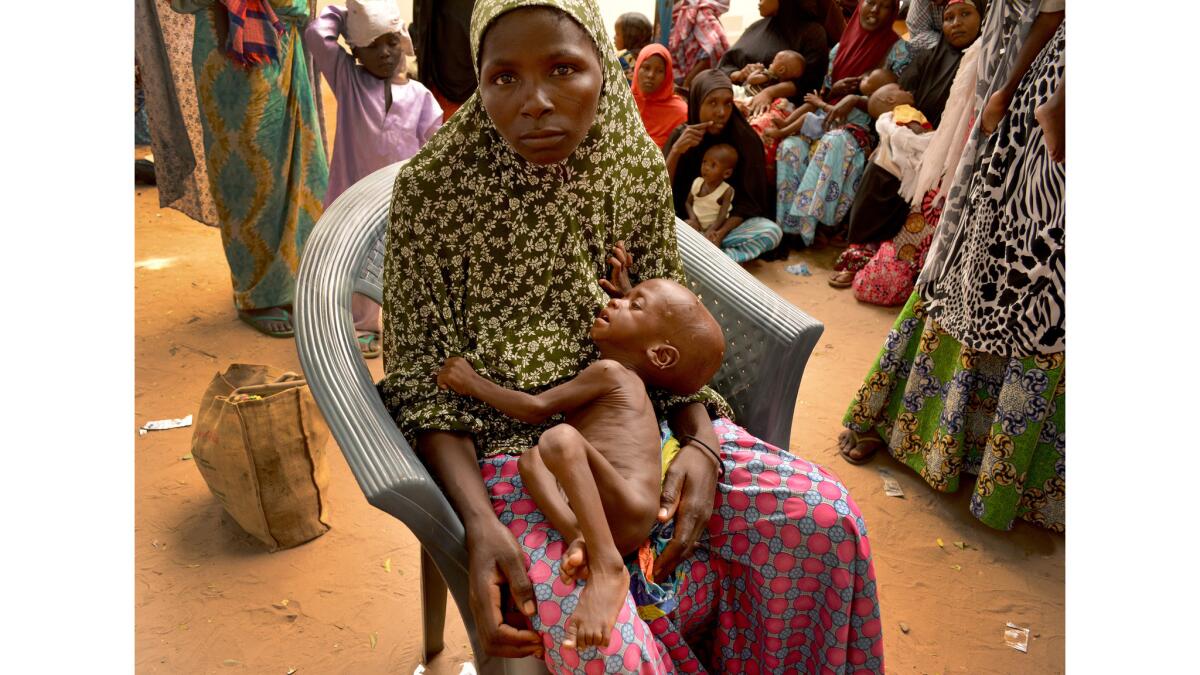
“The situation is bad as it can be,” De Wagt said. “You are talking about the worst-case scenario.” In northeastern Nigeria, the U.N. estimates 1 in 5 of the 400,000 children suffering severe acute malnutrition will die without help.
But with 80% of the northeastern Nigerian state of Borno still threatened by Boko Haram and inaccessible to humanitarian groups, the famine may be worse than feared: About 2.2 million people are trapped in inaccessible villages because of Boko Haram.
Boko Haram wants to establish an Islamic state in Nigeria and has engaged in bloody revenge attacks on any village that has tried to post community guards to protect against its fighters. Some estimates put the number it has killed at 20,000, but there is no real way to know.
Part of Boko Haram’s strategy to destabilize society is to kill farmers, and the day Umar walked back to his village, he worked in fear, making holes on his little plot and carefully dropping a seed into each.
But that afternoon, he saw Boko Haram gunmen racing toward him on foot and other farmers fleeing. He ran, heart pounding like a hunted animal, into the bush. Night fell as he lay hidden.
Earlier that day, his wife, Hadiza Adamu, had set out early to try to save Hassan. She left Hassan’s twin sister, Husseina, who is healthier, in the care of her oldest daughter, 10-year-old Aisha.
Another son, Umar, 4, dressed in a ragged gray cotton shirt, trailed behind her, his head covered in sores where flies congregated thickly. He looked numbly ahead, too exhausted to brush the flies away. He didn’t moan or cry.
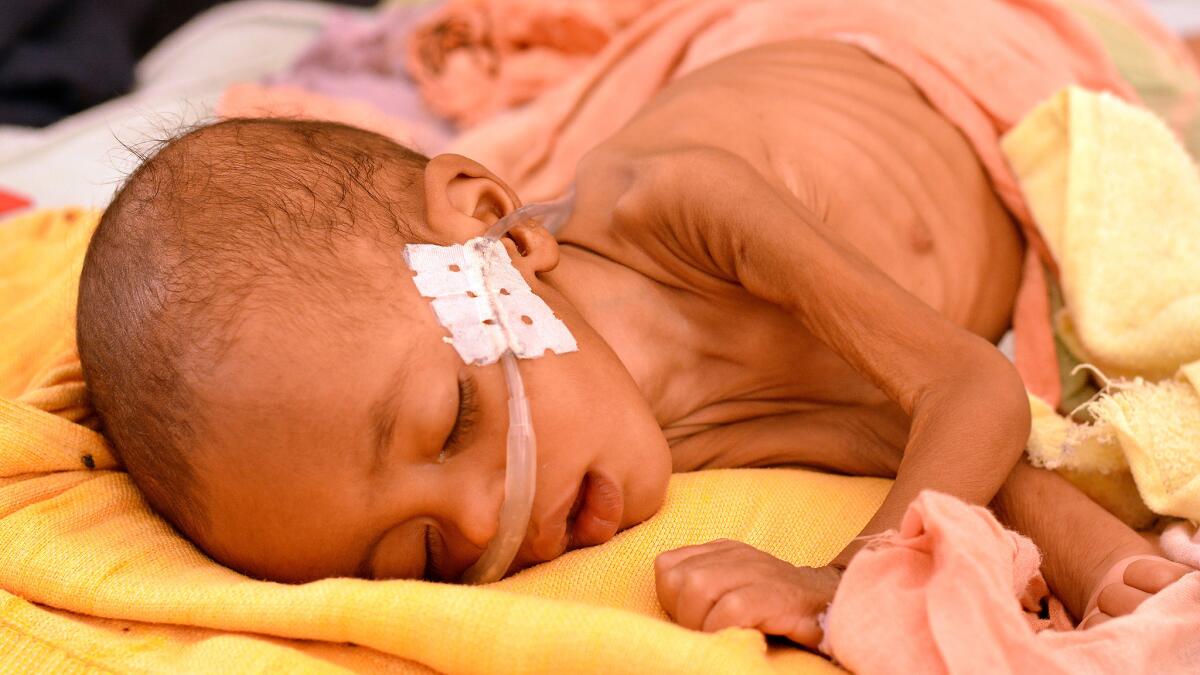
Adamu joined a press of women at a UNICEF malnutrition-management center in Maiduguri and waved a small cloth above Hassan’s head every few seconds, flicking off flies. He listlessly waved his arms as a community worker placed a bracelet designed to measure malnutrition around his upper arm. The circumference, the size of his father’s thumb, showed severe acute malnutrition.
Adamu has lost two daughters before. Halima died five years ago after a fever because they family couldn’t get her to hospital because of Boko Haram attacks in the area.
The second, Binta, was lost when Boko Haram gunmen on motorcycles roared into the village, screaming “God is great!” Umar had gone out to fetch water when the attack started. She dropped her buckets and sprinted to her house for her children, but Binta, 7, had wandered off.
She grabbed the other children and fled into the bush.
Umar tried to run into the bush too, but with so many gunmen chasing down fleeing men, he hid inside his house and somehow escaped detection.
“They burned five old men in their houses, some of them blind. And they killed 18 others,” Adamu said. She searched for Binta in vain. That was two years ago.
“It was only the last two months I gave up hope of finding her,” said Adamu.
Maiduguri’s population has swelled from 1 million to 2.5 million with families like Adamu’s. For nearly two years, she, Umar and the children lived under a flimsy plastic sheet rigged to a branch until the sheet broke just over a week ago. In the recent rainy season, water poured in.
“We had no food, no clothing, no shelter,” Umar said. “When it rained, everything was soaked with water. The children were soaked, all of them.”
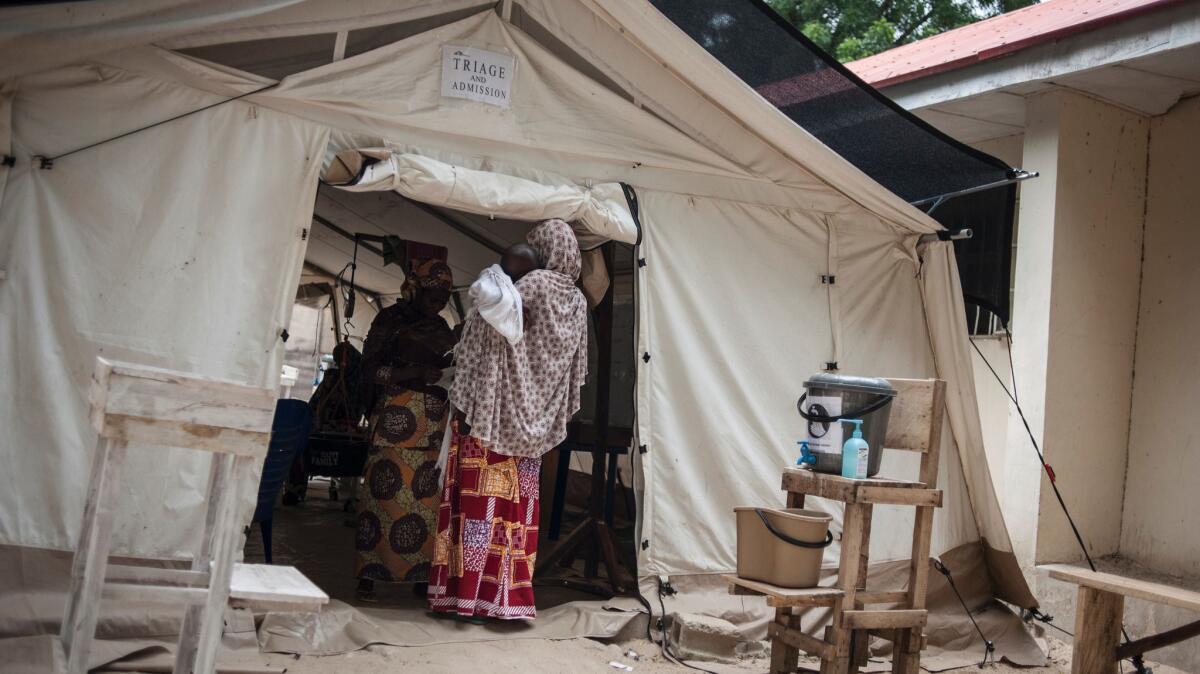
Among the poorest and most desperate men in Maiduguri are the water sellers, pushing heavy carts, their faces furrowed in worry. They fill dozens of cans with well water and hurry to be the first to sell. Doing that job, Umar sometimes scraped up enough for a single bowl of millet, sometimes two. But about four days each week, they had nothing.
Maiduguri also hosts a Doctors Without Borders clinic, a facility whose intensive care unit is nearly silent, filled with motionless children waging their small battles for survival. Their mothers murmur stories of Boko Haram attacks and the years of desperate poverty and hunger on the streets of Maiduguri that followed.
On a recent day, there was Hadija Modu, about 30, who fled with her husband and six children from the village of Yawal, about 20 miles away, after Boko Haram looted their food and cattle, burned the village and killed many people.
They live in Maiduguri under a tree that supports their shelter — a leather hide. Her husband, Mohammed, has been bedridden for months and her two sons, 13 and 7, cart water or sell ice cream to bring in a little food.
Modu cradled her slight, 5-year-old son, Lawan Tahiru, who could not raise his head or keep down the rehydration liquid she gently tried to spoon into his mouth. He bared his teeth, showing his discomfort. At her feet was daughter Bunu, 2.
“When there’s no money for food, then we sit and watch,” sighed Modu. Five of her 11 children have died of sickness over the years.
In the next bed, Yagana Goni’s 3-month-old baby, Mohammed, was so weak that when he opened his tiny mouth to cry, no sound came out. His limbs quivered feebly with the effort. At a camp for displaced people where Goni and her family stay, she said food aid has been sporadic.
“The last four months have been hell,” said Goni. “We missed food so many times. Sometimes we go two days without eating.”
The U.N. World Food Program only received government permission to start work in the region in August. Just a quarter of a $484-million global humanitarian campaign to address the crisis is funded, according to the United Nations. The ongoing violence means many farmers will be unable to plant for the third year in a row.
“The response has been far from adequate,” said De Wagt, the UNICEF nutrition chief, outlining plans to triple his organization’s response in coming months. “Things are happening, but there are still 2.2 million people out there [in inaccessible areas], and I am worried that they have missed another harvest.
“We need to go from house to house, from hut to hut and shelter to shelter, to screen children for malnutrition.”
At the UNICEF center, Adamu was given a therapeutic food ration to feed Hassan. Since the family’s shelter collapsed, they stay in a spare room offered by a friend.
“I feel empty, knowing that I’m helpless,” Umar said. “I look at my son and I feel pity, thinking ‘Will he survive? Or will he die?’ And here I am, poor, without work, without money to take care of him.”
Umar, who believes he is about 40, feels he is a failure. Recently, after spending the night in the bush to escape Boko Haram, he sickened and missed a day that could have been spent scrambling for work.
On Tuesday, Boko Haram gunmen killed five people in a village near Umar’s farm. Yet, determined to get a crop in to feed his family next year — and still haunted by Hassan’s feeble crying — he plans to return to his fields to plant whenever he can find seeds.
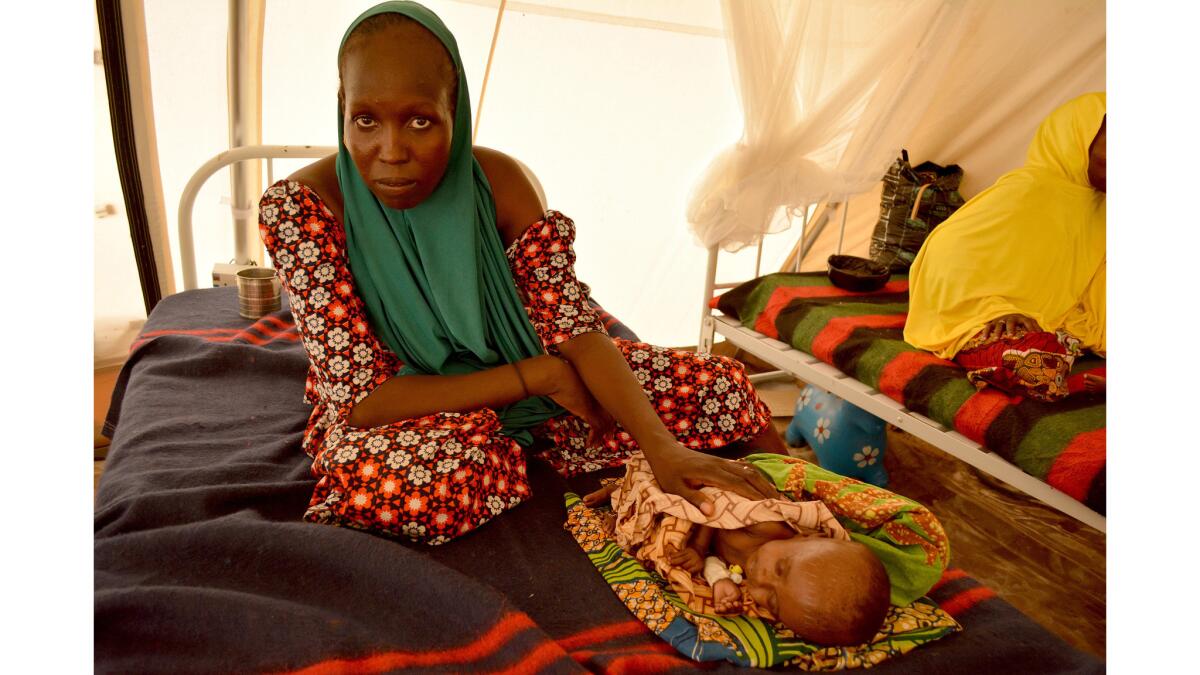
Twitter: @RobynDixon_LAT
ALSO
21 Nigerian schoolgirls released by Boko Haram will receive medical treatment, trauma counseling
This town in South Sudan has no name. It was never supposed to exist. Now 21,000 people live there
More to Read
Sign up for Essential California
The most important California stories and recommendations in your inbox every morning.
You may occasionally receive promotional content from the Los Angeles Times.










